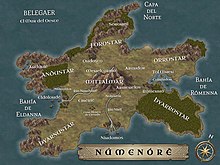Fantasy

La fantasy est un genre littéraire présentant un ou plusieurs éléments surnaturels qui relèvent souvent du mythe et qui sont souvent incarnés par l'irruption ou l'utilisation de la magie. Il est souvent rapproché du merveilleux.
Citations d'écrivains
Je ne suis pas un écrivain de science-fiction. Je n'ai écrit qu'un livre qui soit de la science-fiction, et c'est Farenheit 451. Tous les autres sont de la fantasy.
- Quelle est la différence pour vous ?
- Les fantasy sont des choses qui ne peuvent pas se produire, tandis que la science-fiction évoque des événements qui peuvent se produire.
- (en)
I'm not a science-fiction writer. I've only written one book that's science fiction, and that's Fahrenheit 451. All the others are fantasy.
- What's the distinction for you?
- Fantasies are things that can't happen, and science fiction is about things that can happen.
Orson Scott Card, Comment écrire de la fantasy et de la science-fiction, 2006
- Comment écrire de la fantasy et de la science-fiction, Orson Scott Card, éd. Éditions Bragelonne, 2006, p. 18
- (en) Well, I really want to encourage a kind of fantasy, a kind of magic. I love the term magic realism, whoever invented it — I do actually like it because it says certain things. It's about expanding how you see the world. I think we live in an age where we're just hammered, hammered to think this is what the world is. Television's saying, everything's saying "That's the world." And it's not the world. The world is a million possible things.
- (en) Fantasy has become something you don’t have to be embarrassed about.
- Robin Hobb, 2003, dans Interview de Robin Hobb dans The Guardian (propos recueillis par Alison Flood) le 28 juillet 2017.

- (en) If black kids, Hispanics, Indians both Eastern and Western, don’t buy fantasy — which they mostly don’t — could it be because they never see themselves on the cover?
- À propos d'un préjugé sur la fantasy selon lequel les personnages sont blancs.
- (en) « Some Assumptions about Fantasy. Discours prononcé à la BookExpo America de Chicago (Illinois) le 4 juin 2004 », Ursula Le Guin (trad. Wikiquote), Site Internet d'Ursula Le Guin, 2004 (lire en ligne)
- (en) Assumption 2: Fantasy Land is the Middle Ages. It isn’t. It’s an alternate world, outside our history, as its map isn’t on our map. It may resemble mediaeval Europe in being preindustrial — but that doesn’t justify its having no economics and no social justice. Nor does it explain why nobody there ever feeds or waters their horses, which run all day and night just like a Prius.
- (en) « Some Assumptions about Fantasy. Discours prononcé à la BookExpo America de Chicago (Illinois) le 4 juin 2004 », Ursula Le Guin (trad. Wikiquote), Site Internet d'Ursula Le Guin, 2004 (lire en ligne)
- (en) As for the whole subject of speculative fiction, science fiction, fantasy, I hardly know what to say. When I came into the field, it was a small genre. There were maybe sixty science fiction writers in the United States. The differences now are huge. Fantasy is an enormous industry instead of being barely mentioned stuff for kids. Science fiction is a fairly large industry, although I think it's kind of shrinking. Both of them have gone very commercial, and science fiction keeps having trouble establishing itself as literature, but fantasy has always been part of literature, although it was kind of disinherited by the modernist critics and forced into kiddie lit or genre. And science fiction is perhaps kind of just blending in, in the postmodern world, with everything else.
- (en) If you think it's all spaceships or something, forget it! Most literature up until about 1750 was fantastic literature. Fantasy is probably our oldest mode of storytelling. You certainly, I hope, wouldn't give your kids only books about how the tractor works, or something. You would allow them to read something about winged horses or something like that. Don't be afraid of fantasy or even science fiction. And don't assume that it has no literary value. It might just blow you away.
- À propos de la fiction spéculative.
- « Introduction », Michael Moorcock (septembre 1981), dans Elric le nécromancien, Michael Moorcock (trad. Michel Demuth et Franck Straschitz), éd. Temps Futurs, coll. « Pocket », 1983 (ISBN 2-266-02934-7), p. 10
- (en) Fantasy is uni-age. You can start it in the creche, and it follows you to death.
- Terry Pratchett, 22 avril 2013, dans « Terry Pratchett: 'Fantasy is uni-age' », article de Stephen Moss dans The Guardian - Books le 22 avril 2013.
André François Ruaud, Cartographie du merveilleux, 2001
- Cartographie du merveilleux, André François Ruaud, éd. Folio SF, 2001, p. 10
Citations d'ouvrages critiques ou scientifiques
Anne Besson, La Fantasy, 2007
- La Fantasy, Anne Besson, éd. Klincksieck, coll. « 50 questions », 2007, p. 14
Terry Windling, préface à The Year's Best Fantasy and Horror, volume 4, 1991
- Terry Windling, préface à The Year's Best Fantasy and Horror, volume 4, 1991, cité par André-François Ruaud (2001).
- Cartographie du merveilleux, André François Ruaud, éd. Folio SF, 2001, p. 10
